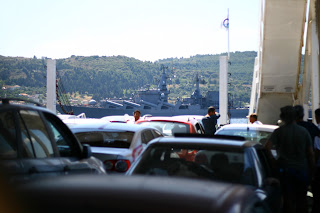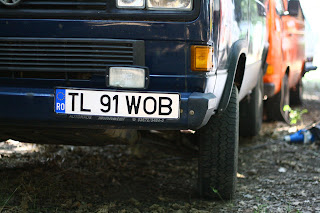deep down in the valley, just above the sea, Kalimero doesn't heat up in the morning. Our window shades are lightproof, so it's no problem to NOT get up before 9.30. So once again, we start slowly, refill our water tanks, wash some clothes and dishes and enjoy life. (Nuclear power plant mutated, teenage mutant hero?) hornets of 5cm size shared our spring, but luckily they were pacified by the cold water.
We wondered whether we should go east to Kemer or Cirali, as there are either bike trails or a nice beach to stand on. But, as the Balkan Bus meeting already started Friday, we decided to rather take a slower tour via the Agaean coast.
It was noon until we were in Fethiye, and we ended up driving until late afternoon.
After our wonderful experience in the Uludag National Park, we decided to look for a decent picnic area in another national park, the Dilek Dagi just south of Izmir. Our travel guidebook only had a few lines about this park, so we took the detour to see if it's worth it.
Unfortunately, the intention of this National Park really seemed to be the saving of nature - a main focus was NOT to serve as a clean-air-picnic spot or poshy ski resort for metropolists, as the Bursa-neighbouring Uludag park.
So, we were stranded in the absolutely picturesque village at the bottom of the mountain, just at the entrance. About half of the buildings were completely falling apart, and the other half was stylishly renovated, with porches, terraces and winestock.
One of these buildings was a local museum, and we were just in time to meet a Turkish-Dutch couple, living in the US, who were given a guided tour by the local landlord. The Turkish girl did some great interpreting for us, so we were told to stop by the next village, the last one before a military zone. The park was not only closed by night, but also regularly patrolled, so we opted for the village.
Few kilometres further, we briefly stopped on the road by a small, local-populated fish restaurant directly on the shoreline. The owner - while serving the charcoal grill - used his sparse English: "eat fish? Camping?"
Sounds great, the overnight price negotation was simple: he suggested "eat fish - no pay." Schahane/Awesome!
The next morning, we hit the road to go further up north. Nothing spectacular to report here - just can't wait to get on the road again, as Willie sings. Like a band of gypsies we go down the highway...
For the night, same plan - National Park, Picnic area, just as at Uludag. This time, we chose Kaz Dagi. At 6.30pm, we stood at closed gates, and the park guard explained us something in fluent Turkish. After 10 sentences and finally realizing our level of Turkish laguage skills, he pulled out a phone and had us talk to the English-speaking Park guide.
The Kaz Dagi seemed to be wonderful, but visits are only possible with him as a guide (again, Nature first, BBQ and Picnic second). Of course, not for free, an overnight stay ends up in 120 Lira. As this is a little bit too much, he told us to come back to the village, he might help us - by explaining us the route to the abandonned campsite of his friend, where we can stay. Not quite sure if we were on the right road, we rode through the bumpy, narrow forest road to find a wonderful space with a small river, olive tree terraces and absolutely no people - except for the owner, who just caught some fish and was about to go back to the village. We talked in a mixture of English, German, Turkish and sand-drawing, and were happy to stay here for the night.
For the next day, we had about 500km to go to Igneada, where the Bus meeting took place. Quite much for one day, even more if you start at 11am and stop to eat, drink tea, refill Diesel, drink tea...
We re-entered Europe via the Dardanelles/Canakkale Bogazi ferry, for the more-than-cheap-price of 12€ for a 5-minute-boat-ride. Heavy navy ships crossed our way.
On Gallipoli at late afternoon, we chose to go to some of the numerous WWI-sites. The Allies started a marine attack on the coast in 1915 to bring their navy to Istanbul, which resulted in almost 100.000 death soldiers in total and countless British war cemeteries spread across the Peninsula.
As the Turkish outnumbered the Allies in terms of casualties and defended their state here, it is as well an important Turkish memorial site with many visitors. A speech of Atatürk few years after the war became famous and is written in huge letters on a house on the peninsula. We found it very moving to read these lines by this great man, spoken short time after WWI in 1934 - especially when you think of what the small, moustache-wearing lunatic WWI-soldier in Germany did at the same time.
Heroes who shed their blood and lost their lives!
You are now lying in the soil of a friendly country. Therefore rest in peace.
There is no difference between the Johnnies and Mehmets to us where they lie side by side here in this country of ours.
You, the mothers, who sent their sons from far away countries wipe away your tears; your sons are now lying in our bosom and are in peace. After having lost their lives on this land they have become our sons as well.
Thanks to a great tip from the IG16-Forum (thanks, Martin/silversearcher!), we then pulled over at a white-sanded beach on the northern part of the peninsula, where we head a great sunset and the mirror-flat Agaean Sea to swim in.
What a surprise - it became noon before we departed, but this time also because poor Kalimero worked hard with the soft sand. With our small Diesel engine and fully inflated tyres, no chance to get out. Some wise tips from syncro drivers in the head: you don't need horsepower and mattings to get out, you need to deflate the tyres. And yes, with 1.5bars, we easily drove out.
The last 300km to Igneada took us 7h, so we arrived at the Bus meeting just before dawn. On the way, we also saw our first rain since leaving Germany 4 weeks ago.
In Igneada, under shady oak trees, we spent wonderful 2 nights with the crazy Bus and Beetle owners from 8 countries. All people were more than friendly and welcoming, even though communication was not always easy - but always funny!
In Germany, we have tons of Buses, spare parts and Volkswagen stuff. In Turkey, Romania, Bulgaria etc., it takes much more effort to keep these cars not only running, but also in the shape we had seen on the meeting.
It was really a pleasure to be at this meeting, we can only recommend a Balkan trip to attend the annual meeting to any Bus driver in Germany!





























Keine Kommentare:
Kommentar veröffentlichen